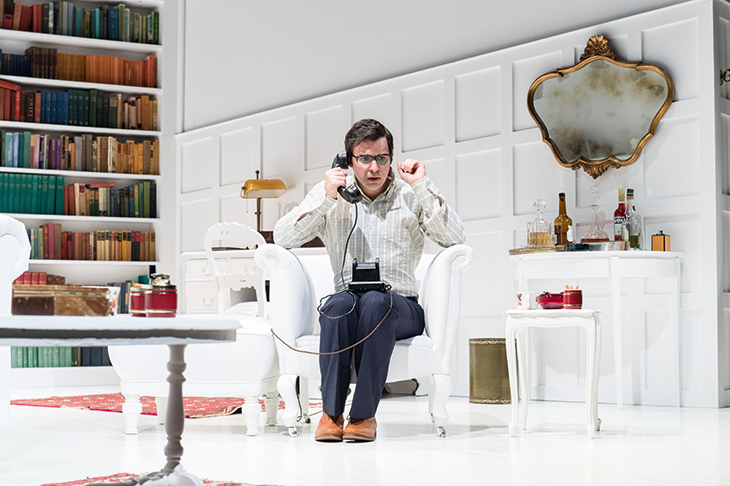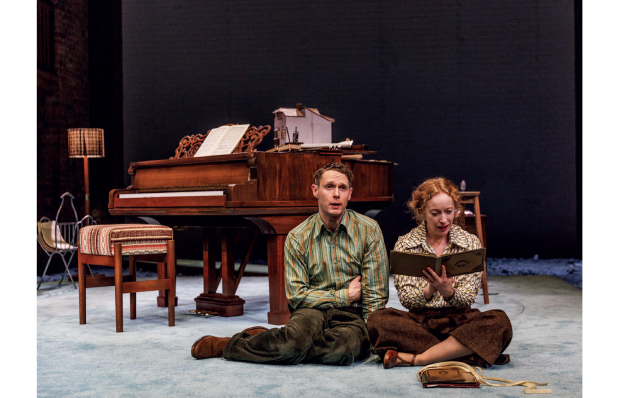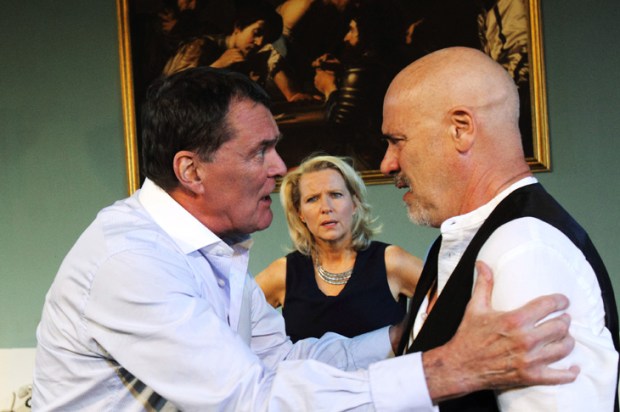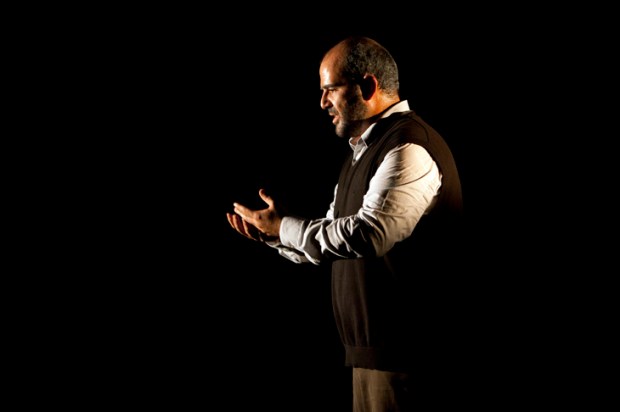Christopher Hampton’s 1968 play The Philanthropist examines the romantic travails of Philip, a cerebral university philologist, forced to choose between his unexciting fiancée and a predatory seductress. The play’s opening scene contains one of the most brilliant comic shocks in all drama. And the paradoxes and flashes of Hamptonian wit are an everlasting treat. ‘I’m a man of no convictions,’ says Philip. ‘At least I think I am.’
The production, brilliantly directed by Simon Callow, is exquisite to look at. Libby Watson creates a stark white sitting room, with great pools of crimson carpet, enlivened by colourful rows of books that are harmonised carefully, but not obtrusively, with the overall palette. The surgical blankness of the space symbolises Philip’s monastic detachment from life. There is one difficulty. The classic furniture and the men’s clothes offer no information about dates and times. The women’s dresses might be 1960s originals or contemporary borrowings from that decade. The only unequivocal hint comes from Araminta’s fake upper-class accent (a passing Bohemian fad), which locates us in the age of the hippies.
Were it more clearly a period piece, the grotesque comedy would be easier to digest. Much of it jars nowadays. The characters joke about a recent attack on the House of Commons that left 11 MPs dead. A terror group that murders novelists is given the same light-hearted treatment. A rich novelist who abandoned left-wing politics ‘for tax reasons’ has a contempt for the poor that sounds horribly callous to the modern ear. Araminta (Lily Cole) casually mentions being molested, aged 12, by her uncle, ‘which rather takes the romance out of things’. Charlotte Ritchie’s Celia turns her encounters with rapacious tutors into a party piece that amuses her varsity pals enormously. As it would have done at the time.
But today’s viewer wonders why a sexual abuse inquiry hasn’t begun. The atmosphere of prejudice is never questioned. The women accept their roles as gorgeous insects who dote on the menfolk, laughing dutifully at their jokes, and never challenging a system of values that deprives them of status or money. Simon Bird is adorably twerpish as Philip, and Tom Rosenthal gives a persuasive account of Donald, the smug Oxbridge lifer. Matt Berry, as the cynical novelist, wears a velvet suit of brightest purple, which makes him look like a Quality Street. And he’s too tidy and sleek. The character needs more rock-star bedevilment and sexual magnetism.
Those points aside, I can hardly praise this show highly enough. The pedantry of the quibbling dons is entertaining to the point of being contagious. When Philip was asked for a word meaning ‘bloodless’, he replied ‘etiolated’. A student of philology beside me muttered the correction, ‘anaemic’.
Whisper House is superbly designed to throw its audience into a pit of despair. The setting is a haunted lighthouse on America’s eastern seaboard during the second world war. An orphan boy lives with an embittered club-footed spinster and a meek but wise Japanese servant who is loathed by the local sheriff. The dismal shoreline is menaced by the ghosts of two drowned musicians and by prowling Nazi submarines that threaten to open fire at any moment and blast everyone to bits. The first song ‘Better To Be Dead’ informs us that the human race would have been far happier had the characters on stage never lived. Anyone tempted to dispute this thesis (and I assented to it immediately) is destined to hear its message repeated, in ever more miserable versions, five times during the show.
The set is equally committed to the negative vibe. Centre-stage is a wooden crater the size of a Jacuzzi which appears to be Human Melancholy realised in the form of varnished timber. The storyline moves at the speed of an opiated turtle crossing an ocean of molasses. After an hour, the Japanese guy has decided to hide from the nasty sheriff. After the second hour, he’s been biffed on the nose and has revealed his love for the embittered club-footed spinster. The show is, of course, an allegory for Trumpism. The orphan boy, representing America, ponders the moral gulf between the spinster who loves the servile foreigner and the sheriff who punches him.
The show may be popular with Trump-haters searching for the antidote to the Anti-christ. The roles of the ghosts are played by Simon Bailey (of the group Teatro) and Niamh Perry. Perhaps to compensate for the meagreness of their parts they were allowed to perform a rock duet at the curtain call and because it had no legible connection to the foregoing action it came as a delicious surprise. Niamh Perry has the looks of a goddess and a sweet needling voice, with a narrow range, which gets inside your head and refuses to budge. She deserves a band and a record deal.
Got something to add? Join the discussion and comment below.
Get 10 issues for just $10
Subscribe to The Spectator Australia today for the next 10 magazine issues, plus full online access, for just $10.
You might disagree with half of it, but you’ll enjoy reading all of it. Try your first month for free, then just $2 a week for the remainder of your first year.














Comments
Don't miss out
Join the conversation with other Spectator Australia readers. Subscribe to leave a comment.
SUBSCRIBEAlready a subscriber? Log in